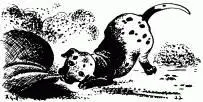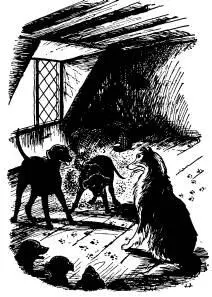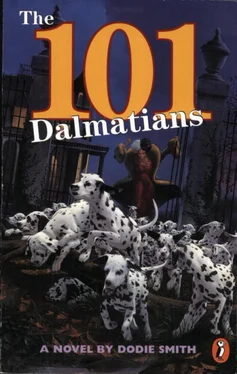It was soon after this that the Cadpig called out, “Look! Little painted houses on wheels!”
Pongo saw them at the same moment, and he knew they were not houses. They were caravans.
He had seen them once when out with Mr. Dearly and had heard Mr. Dearly say that gipsies lived in caravans and gipsies sometimes stole valuable dogs.
“Halt!” said Pongo instantly.
Could they get past the caravans without being seen? He wasn’t going to risk it. Between them and the nearest caravan was an open gate. He would lead the puppies through it and take them through the fields until they were well past the caravans. Swiftly he gave his instructions, which were handed on from pup to pup: “We are to keep dead quiet and follow Pongo through the gate.”
And thus did the owner of one of the keenest brains in Dogdom make one of his few mistakes. For in the caravan nearest to them an old gipsy woman was awake and looking out of the little back window. She saw the approaching Dalmatians and at once woke her husband. He was beside her at the window just as Pongo led the way into the field.
The old gipsy woman never read newspapers, so she knew nothing about the stolen puppies. But she knew that here were many valuable dogs. And she knew something else, which Pongo did not know. There is a connection between Dalmatians and gipsies. Many people believe that it was the gipsies who first brought Dalmatians to England, long, long ago. And nothing like as long ago as that, there were gipsies who travelled round England with Dalmatians trained to do tricks. And these performing dogs earned money for the gipsies. The old woman could remember such dogs, and she thought how splendid it would be if all these Dalmatians could be trained as money-earners.
“Quick! Close the gate!” she said to her husband. She spoke in the strange gipsy language, which is called Romany. “The only other way out of that field is through a break in the hedge. I will rouse the camp, and we will all stop the dogs there and catch them.”
In less than two minutes the whole gipsy encampment was awake. Children cried, dogs barked, horses neighed. It was still so dark that it took Pongo five minutes to find the break in the hedge. And when he found it, he also found the way barred. All the gipsies were there, with sticks and ropes.
“Back to the gate, as fast as you can!” he cried to the pups. But when they reached the gate it was closed. They were trapped.
Pongo barked loudly, hoping that some gipsy dog might help him. Many gipsy dogs barked in answer, but they had all been shut up in the caravans in case they should fight the Dalmatians. In any case, they barked only in Romany, so they could not understand a word Pongo said.
But someone else did. Suddenly Pongo heard the high neigh of a horse close at hand—and, oh, most wonderful, the horse could neigh normally, as well as in Romany. It understood Pongo, and he understood it. Horses are nearly always friendly to Dalmatians—perhaps because of those days when Dalmatians were trained to follow carriages. This horse was not old enough to remember such days, but he took an instant liking to Pongo, Missis, and all the pups. If these pleasant creatures wished to come out of the field, nothing could be easier. He strolled up, opened the gate with his long, strong teeth, and swung it back. Out poured the puppies.
“Lead them past the caravans as fast as you can!” Pongo shouted to Missis, and waited to see the last pup out of the field.
“What a very large family you and your wife have,” said the horse. “My wife and I have never had more than the one. Well, good luck to you.”
He waved aside Pongo’s thanks and then, being a very tidy horse, he carefully closed the gate again. So never did the gipsies—all waiting at the break in the hedge—know how their prisoners got away.
Helter-skelter along the road went Missis, the puppies, and, finally, Pongo. (The pups who drew the Cadpig’s cart stuck faithfully to their task.) The shut-in Romany dogs heard them and shook the caravans in their efforts to get out. Volleys of furious barking came from the little windows.
“The caravans bark but the dogs move on,” remarked Pongo when he felt they were out of danger.
A few minutes later they reached the village where they were to sleep. The Sheepdog’s friend, a handsome Collie, was waiting to welcome them.
“No talk until you’re safely hidden,” he said. “It’s almost light.”
Quickly they followed him across the village green to three old gabled houses. The baker’s was in the middle, between the butcher’s and the chimney-sweep’s. The baker and the butcher and the sweep were all windowers and, as it was Sunday, had already gone to spend Christmas with their married daughters, which was just as well.
The baker’s shop would not have been nearly big enough to house all the pups, but luckily there was a large bakehouse at the back. And soon every pup was safely in and enjoying a splendid sausage roll. Pongo and Missis chatted to the Collie while they ate. He shook his head worriedly when he heard about the gipsies.
“A narrow escape,” he said. “The trouble is that Dalmatians are such noticeable dogs. Ninety-nine of you together are spectacular—though I mean it as a compliment. You’d be much safer if you were black.”
“Like that nice little pup over there,” said Missis.
“What pup?” The Collie looked across the bakehouse, then said sharply, “That pup doesn’t belong in this village. Who are you, my lad? Where have you come from?”

The black pup did not answer. Instead, he came running to Missis and butted her in the stomach.
“Here, hold hard, young man!” said Missis. Then she gasped. “Goodness, it is! It isn’t! It is Roly Poly!”
The fat puppy who was always getting into mischief had found his way into a shed at the back of the sweep’s house and had a fight with a bag of soot.
“Mercy, you’ll need some washing!” said his mother.
Then it was that one of the keenest brains in Dogdom had one of its brainiest waves.
“Roly Poly,” said Pongo, “was there a lot of soot at the sweep’s?”
“Bags and bags,” said Roly Poly.
“Then we are all going to be black dogs,” said Pongo.
“Your husband is a genius,” said the Collie to Missis as he showed them all into the sweep’s shed.
There was any amount of soot—waiting to have done with it whatever sweeps do do with soot.
“Ten dogs forward at a time!” commanded Pongo. “Pups roll! Pups rub noses!”
In a very short time there were ninety-seven pitch-black pups.
“And now, my love,” said Pongo to Missis. “Let us take a roll in the soot.”
Frankly, Missis did not fancy it. She hated soiling her gleaming white hair and losing its smart contrast with her beautiful black spots. But when Pongo had helped her with the final touches he said: “Why, Missis, as a black dog, you’re slimmer than ever. You’re positively svelte! ” and then she felt much better.
Then Pongo said, “How does soot suit me?”
“Suit soots you beautifully,” said Missis, and all the pups roared with laughter at her mistake.
Then they all went back to the bakehouse and settled down to sleep. The Collie said he would call them as soon as it was dark. They would have only five miles to go—to another bakery—but he felt they should get the journey over early as he had heard there might be snow.

“But there may be cars on the road until late, as it is Christmas Eve—and Sunday,” he told them. “So you must go by the fields. I shall escort you. Rest well now.”
Читать дальше












